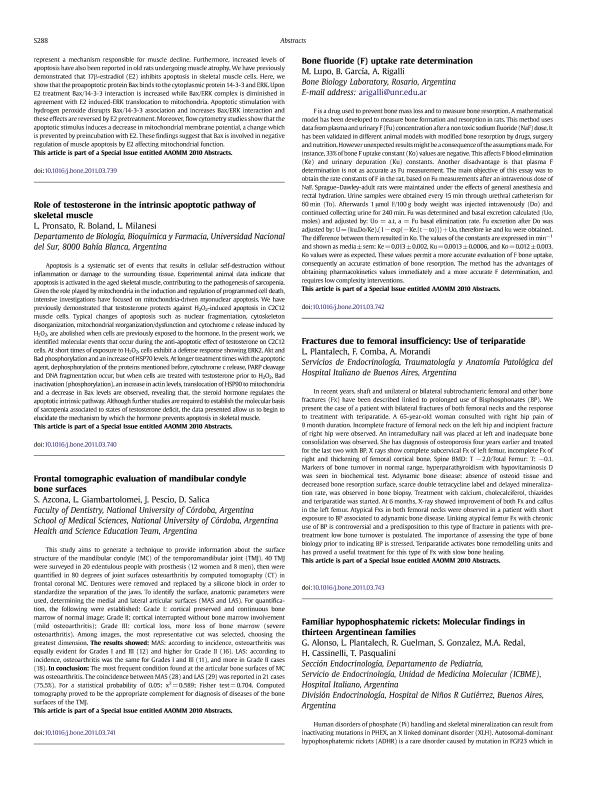Mostrar el registro sencillo del ítem
dc.contributor.author
Pronsato, Lucía

dc.contributor.author
Boland, Ricardo Leopoldo

dc.contributor.author
Milanesi, Lorena Magdalena

dc.date.available
2019-01-10T19:23:45Z
dc.date.issued
2011-06
dc.identifier.citation
Pronsato, Lucía; Boland, Ricardo Leopoldo; Milanesi, Lorena Magdalena; Role of testosterone in the intrinsic apoptotic pathway of skeletal muscle; Elsevier Science Inc; Bone; 48; 6; 6-2011; 288-288
dc.identifier.issn
8756-3282
dc.identifier.uri
http://hdl.handle.net/11336/67910
dc.description.abstract
Apoptosis is a systematic set of events that results in cellular self-destruction without inflammation or damage to the surrounding tissue. Experimental animal data indicate that apoptosis is activated in the aged skeletal muscle, contributing to the pathogenesis of sarcopenia. Given the role played by mitochondria in the induction and regulation of programmed cell death, intensive investigations have focused on mitochondria-driven myonuclear apoptosis. We have previously demonstrated that testosterone protects against H2O2-induced apoptosis in C2C12 muscle cells. Typical changes of apoptosis such as nuclear fragmentation, cytoskeleton disorganization, mitochondrial reorganization/dysfunction and cytochrome c release induced by H2O2, are abolished when cells are previously exposed to the hormone. In the present work, we identified molecular events that occur during the anti-apoptotic effect of testosterone on C2C12 cells. At short times of exposure to H2O2, cells exhibit a defense response showing ERK2, Akt and Bad phosphorylation and an increase of HSP70 levels. At longer treatment times with the apoptotic agent, dephosphorylation of the proteins mentioned before, cytochrome c release, PARP cleavage and DNA fragmentation occur, but when cells are treated with testosterone prior to H2O2, Bad inactivation (phosphorylation), an increase in actin levels, translocation of HSP90 to mitochondria and a decrease in Bax levels are observed, revealing that, the steroid hormone regulates the apoptotic intrinsic pathway. Although further studies are required to establish the molecular basis of sarcopenia associated to states of testosterone deficit, the data presented allow us to begin to elucidate the mechanism by which the hormone prevents apoptosis in skeletal muscle.
dc.format
application/pdf
dc.language.iso
eng
dc.publisher
Elsevier Science Inc

dc.rights
info:eu-repo/semantics/openAccess
dc.rights.uri
https://creativecommons.org/licenses/by-nc-sa/2.5/ar/
dc.subject
Testosterone
dc.subject
Apoptosis
dc.subject
Skeletal Muscle
dc.subject
Mitochondria
dc.subject
Intrinsic Pathway
dc.subject.classification
Otras Ciencias Biológicas

dc.subject.classification
Ciencias Biológicas

dc.subject.classification
CIENCIAS NATURALES Y EXACTAS

dc.title
Role of testosterone in the intrinsic apoptotic pathway of skeletal muscle
dc.type
info:eu-repo/semantics/article
dc.type
info:ar-repo/semantics/artículo
dc.type
info:eu-repo/semantics/publishedVersion
dc.date.updated
2018-12-20T18:15:12Z
dc.journal.volume
48
dc.journal.number
6
dc.journal.pagination
288-288
dc.journal.pais
Países Bajos

dc.journal.ciudad
Amsterdam
dc.description.fil
Fil: Pronsato, Lucía. Consejo Nacional de Investigaciones Científicas y Técnicas. Centro Científico Tecnológico Conicet - Bahía Blanca. Instituto de Ciencias Biológicas y Biomédicas del Sur. Universidad Nacional del Sur. Departamento de Biología, Bioquímica y Farmacia. Instituto de Ciencias Biológicas y Biomédicas del Sur; Argentina
dc.description.fil
Fil: Boland, Ricardo Leopoldo. Consejo Nacional de Investigaciones Científicas y Técnicas. Centro Científico Tecnológico Conicet - Bahía Blanca. Instituto de Ciencias Biológicas y Biomédicas del Sur. Universidad Nacional del Sur. Departamento de Biología, Bioquímica y Farmacia. Instituto de Ciencias Biológicas y Biomédicas del Sur; Argentina
dc.description.fil
Fil: Milanesi, Lorena Magdalena. Consejo Nacional de Investigaciones Científicas y Técnicas. Centro Científico Tecnológico Conicet - Bahía Blanca. Instituto de Ciencias Biológicas y Biomédicas del Sur. Universidad Nacional del Sur. Departamento de Biología, Bioquímica y Farmacia. Instituto de Ciencias Biológicas y Biomédicas del Sur; Argentina
dc.journal.title
Bone

dc.relation.alternativeid
info:eu-repo/semantics/altIdentifier/url/https://www.sciencedirect.com/science/article/pii/S8756328211008489
dc.relation.alternativeid
info:eu-repo/semantics/altIdentifier/doi/https://dx.doi.org/10.1016/j.bone.2011.03.740
Archivos asociados
